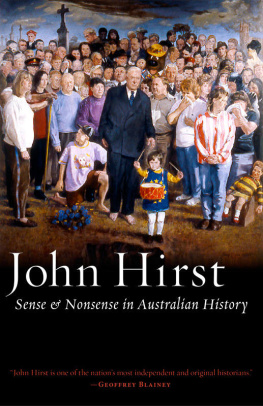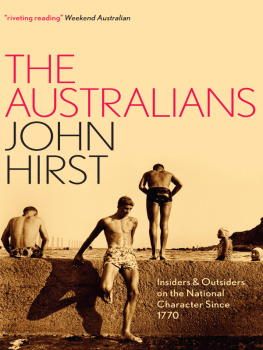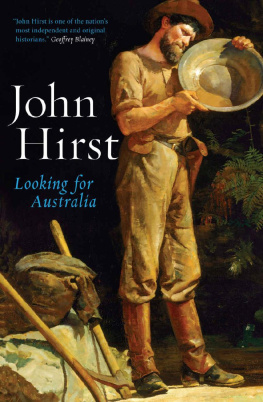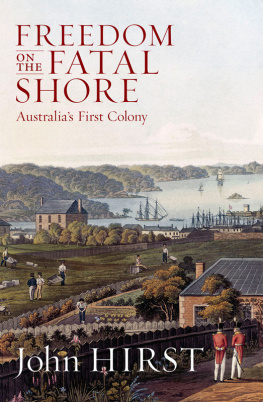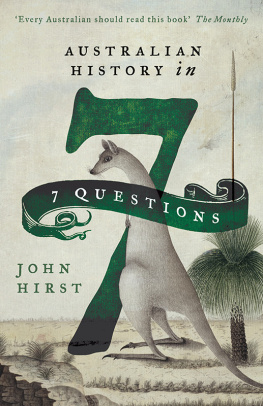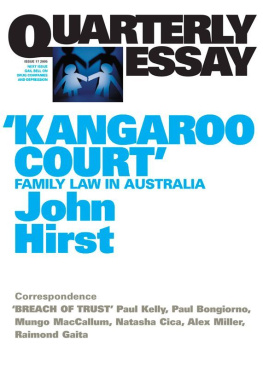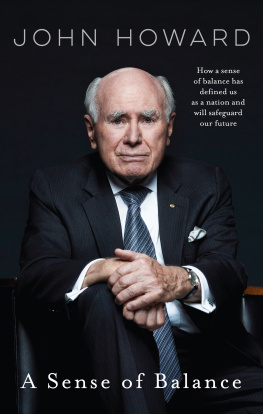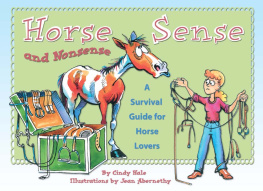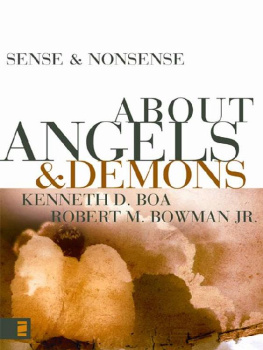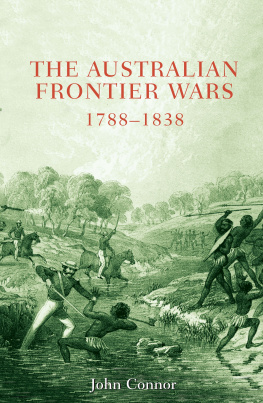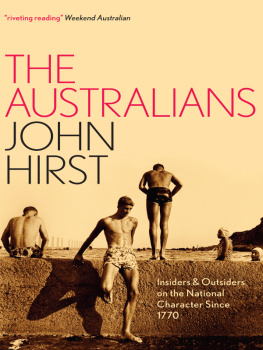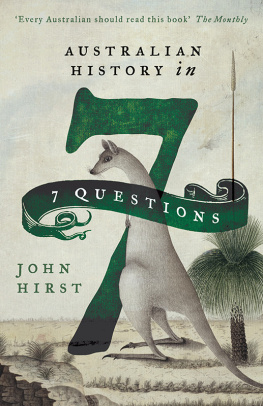John Hirst - Sense and Nonsense in Australian History
Here you can read online John Hirst - Sense and Nonsense in Australian History full text of the book (entire story) in english for free. Download pdf and epub, get meaning, cover and reviews about this ebook. year: 0, genre: History. Description of the work, (preface) as well as reviews are available. Best literature library LitArk.com created for fans of good reading and offers a wide selection of genres:
Romance novel
Science fiction
Adventure
Detective
Science
History
Home and family
Prose
Art
Politics
Computer
Non-fiction
Religion
Business
Children
Humor
Choose a favorite category and find really read worthwhile books. Enjoy immersion in the world of imagination, feel the emotions of the characters or learn something new for yourself, make an fascinating discovery.
- Book:Sense and Nonsense in Australian History
- Author:
- Genre:
- Year:0
- Rating:5 / 5
- Favourites:Add to favourites
- Your mark:
- 100
- 1
- 2
- 3
- 4
- 5
Sense and Nonsense in Australian History: summary, description and annotation
We offer to read an annotation, description, summary or preface (depends on what the author of the book "Sense and Nonsense in Australian History" wrote himself). If you haven't found the necessary information about the book — write in the comments, we will try to find it.
Sense and Nonsense in Australian History — read online for free the complete book (whole text) full work
Below is the text of the book, divided by pages. System saving the place of the last page read, allows you to conveniently read the book "Sense and Nonsense in Australian History" online for free, without having to search again every time where you left off. Put a bookmark, and you can go to the page where you finished reading at any time.
Font size:
Interval:
Bookmark:
Praise for John Hirst, Sense and Nonsense in Australian History
One of the nations most independent and original historians
GEOFFREY BLAINEY
John Hirst is the gadfly of Australian history, stinging
and provocativeSTUART MACINTYRE
essential reading for those who want to ponder, let alone write and teach about, Australian history
ROBERT MURRAY, the Weekend Australian
Sense and Nonsense in Australian History is an entertaining collection of essays which deserves to be read, re-read and debated by Australians interested in national identity.
LYNDON MEGARRITY, Overland
A powerful controversialist a brilliant historian
Australian Book Review
What a good, if overdue, idea: judging history by its content of common sense and context rather then Left , Right, postmodern and so onROBERT MURRAY, Quadrant
one of Australias most productive historians
ROSS FITZGERALD, the Sydney Morning Herald
Hirsts fine discriminations and historical digging helps us understand why Australia is one of the oldest and most stable democracies in the worldthe Age
punchy, learned, wittythe Canberra Times
a stimulating and engaging contribution to current debates
over Australian historythe Bulletin
Sense and Nonsense in Australian History
Published by Black Inc. Agenda
Series Editor: Robert Manne
Other books in the Black Inc. Agenda series:
Whitewash: On Keith Windschuttles Fabrication
of Aboriginal History ed. Robert Manne
The Howard Years ed. Robert Manne
Axis of Deceit Andrew Wilkie
Following Them Home: The Fate of the Returned
Asylum Seekers David Corlett
Civil Passions: Selected Writings Martin Krygier
Do Not Disturb: Is the Media Failing Australia?
ed. Robert Manne
The Weapons Detective Rod Barton
Scorcher Clive Hamilton
Dear Mr Rudd ed. Robert Manne
The Dreaming and Other Essays W.E.H. Stanner
SENSE and
NONSENSE in
AUSTRALIAN
HISTORY
John HIRST

Published by Black Inc. Agenda,
an imprint of Schwartz Publishing Pty Ltd
37-39 Langridge Street
Collingwood VIC 3066 Australia
email: enquiries@blackincbooks.com
http://www.blackincbooks.com
John Hirst, 2009
ALL RIGHTS RESERVED.
No part of this publication may be reproduced, stored in a retrieval system, or transmitted in any form by any means electronic, mechanical, photocopying, recording or otherwise without the prior consent of the publishers.
National Library of Australia Cataloguing-in-Publication entry:
Hirst, John.
Sense and nonsense in Australian history / John Hirst.
9780977594931 (paperback)
9781921825408 (ebook)
Australia--History.
Cover design: Thomas Deverall
Contents
For over twenty years I have been quarrelling in print with the standard left-liberal view of Australian history. I have also been puzzling over how best to write the history of societies that were colonies. The history of the mother country cannot be left behind; it remains the context in which colonial society forms and lives.
When Robert Manne invited me to assemble my essays for publication, I was pleased to find that they deal with important themes throughout our history since 1788, from convict society to the republic. Taken together they provide the interpretative framework for an alternative history of Australia which frees me from the obligation of writing it.
The essays appear here without footnotes. Readers who want to check the evidence should go to the original versions, whose locations are given in an appendix. The essay How Sorry Can We Be? appears here for the first time. In this case I have given more indication in the text of the works on which I am drawing.
I thank Robert Manne, the editor of Black Inc.s Agenda series, for the invitation to produce this book and for his launching of me as historian-cum-controversialist when he was editor of Quadrant. At La Trobe University I have enjoyed great support from many colleagues and have been instructed and stimulated at the seminar on the Sociology of Culture founded by Claudio Veliz and in my time run by John Carroll. At Black Inc. I have been fortunate again to work with Chris Feik who is a sensitive and supportive editor.
John Hirst
H istorians write from the evidence, but also from their understanding of how the world works and how they would like it to work. A historian who thinks large impersonal forces have shaped our destiny will write a different history from one who thinks that great leaders have turned the tide or made a tide. A socialist will not write approvingly of the rise of modern capitalist society. A free marketeer will be hard put to treat socialists sympathetically.
The great majority of the historians of Australia over the last forty or fifty years have been left-leaning, progressive people. I was taught Australian history by them and their books. I was brought up on Russel Ward The Australian Legend ( 1958) and Robin Gollan Radicaland Working Class Politics ( 1960); my first teacher at the University of Adelaide in the early 1960s was Ian Turner. These three, as it happens, were more than left-leaning: they had all been members of the Communist Party. They were all properly trained academic historians and none was a crude propagandist. They wrote under tighter control of their discipline than the next generation of radicals. I still value and draw on their books. But their sympathies were plain.
My sense of how the world works and my political allegiance were at first those of my teachers. They are now different. With this change, my history-writing has changed. I am not sure how these two changes relate to each other. I wonder if my study of history has changed my views or whether my views changed and then my history-writing. By the time I acquired my BA I believed that the Labor Party was the only party decent people could support. Labor promised a new, just social order; Liberals were the tools of big business, selfish and stupid.
I proceeded immediately to study for a PhD. The topic I chose for my thesis required me to study the South Australian history of both the Labor and Liberal parties. They both had their origins in Adelaide; the Labor Party in the trade unions and the Liberals among the citys businessmen and large property holders. If either group was to be a governing party, it had to gain support in the country. It took them some time to realise that country people were not automatically going to support a city organisation and its program.
The Labor Party had to drop its plan to tax all land, big farms and small, and it had to give country branches a real say at conferences. With these concessions made, it did win office in its own right for the first time in 1910. But the hard men in the trade unions were disgusted at the moderation of the Labor government. They turned on the Labor politicians, one of whose offences was to have made these concessions to the country. During World War I the hard men expelled the leading Labor politicians (for supporting conscription) and they reduced country branches to a nullity at Labor conferences. In future delegates had as many votes as the number of members they represented. A trade union delegate might have 10,000 votes and a country branch delegate ten.
As I followed this struggle, I found my sympathies were very much with parliamentarians. I was a Labor supporter (I was never a party member) but I was perfectly happy for parliamentarians to accept the restraints that winning government required.
Next pageFont size:
Interval:
Bookmark:
Similar books «Sense and Nonsense in Australian History»
Look at similar books to Sense and Nonsense in Australian History. We have selected literature similar in name and meaning in the hope of providing readers with more options to find new, interesting, not yet read works.
Discussion, reviews of the book Sense and Nonsense in Australian History and just readers' own opinions. Leave your comments, write what you think about the work, its meaning or the main characters. Specify what exactly you liked and what you didn't like, and why you think so.

